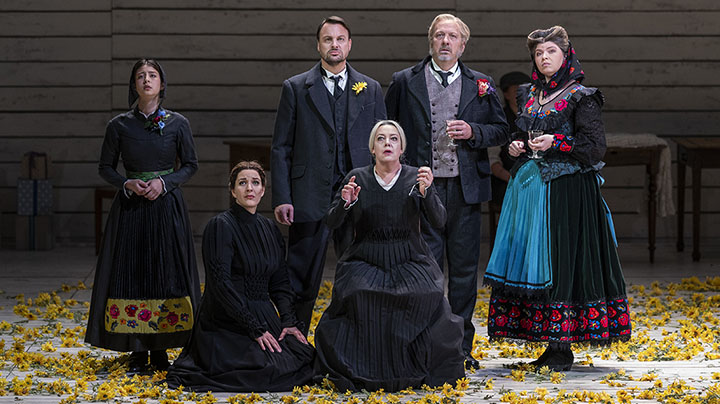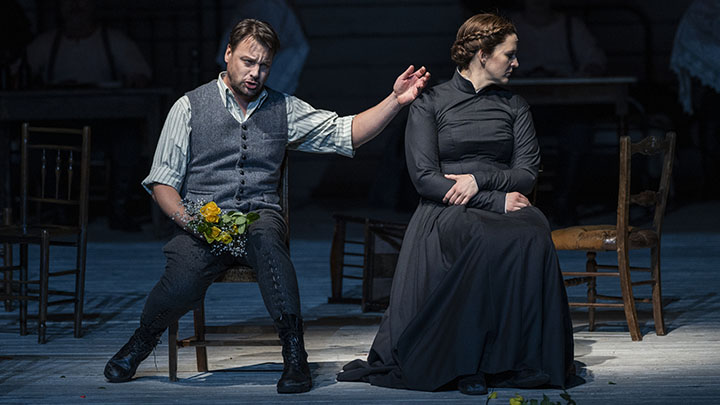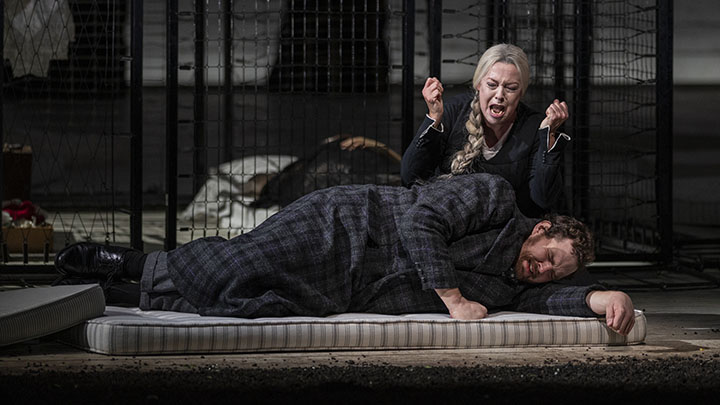
Set in a small village in 19th century Moravia, where moral codes are religion-based and extremely strict, the opera includes mutilation by slashing, unwanted pregnancy, extreme selfishness, and eventually infanticide. But the overpowering themes of sin and repentance, and finally profound forgiveness, uplifts the piece to a moving and, in an odd way, happy ending.
Lyric Opera of Chicago’s currently running Jenufa features spectacular singing (especially from the two female leads) surrounded by an excellent, if occasionally over the top production by Claus Guth, here staged by revival director Alex Weidauer. The set by Michael Levine and costumes by Gesine Voolm are mostly in shades of grey, black, and white, with only occasional splashes of color from the dresses of wedding guests. The walled-in set contributes mightily to the claustrophobic atmosphere of life in this village.
Jenufa is a village girl who is pregnant by her lover Steva, and she desperately prays that he will marry her to save her from shame and ostracism. Steva’s half- brother Laca also loves Jenufa desperately. When she rejects him, Laca slashes her face with a knife in a sudden and shocking act of violence. In the second act, Jenufa has been hidden away in the cottage of her stepmother, The Kostelnicka, where she has given birth in secret to a baby boy. When Steva refuses again to marry Jenufa, Kostelnicka begs Laca to marry her, but he refuses to take Steva’s baby. Desperate to save Jenufa’s happiness and honor, Kostelnicka realizes that the baby must be sacrificed if Jenufa is to be married. While Jenufa is sleeping, she takes the baby to the river and drowns it, telling Jenufa that the baby has died while she was in a fever for two days. Laca then agrees to marry Jenufa and she accepts him. As Laca and Jenufa are about to be married, villagers rush in to say that a baby has been found under the ice in the river. They assume that Jenufa killed it, but Kostelnicka takes the blame and waits to be led off. Jenufa, in a profound act, forgives her.
Norweigian soprano Lise Davidsen made a stunning Lyric debut in the title role. She has a huge sound, a “microphone in the throat” voice, filling the house with resplendent tone. The voice is even throughout the registers, high notes without a hint of strain. She brings intense vocal dynamics and colors in the role and is dramatically splendid in her acting as well. A glorious performance.
She is well matched by the Kostelnicka of Nina Stemme, who was a superb Elektra here just a few years ago. She brings a harrowing emotional intensity to the role, as well as a potent and powerful voice. Her scenes with Jenufa provide dueling huge voices soaring into the audience.
The men can’t quite match the ladies in vocal size, but they provide fine characterizations and fluid voices. The lovesick Laca is sung with plangent sweetness by Pavel Cernoch. Richard Trey Smagur seems a bit miscast as Steva, and his liquid tenor is occasionally swallowed by the orchestra. Marianne Cornetti is a stolid presence as Grandmother Buyja, and a number of Ryan Center students and alumni shine in minor roles.
Janacek’s score in remarkable—there are no formal arias, but realistic dialogue and dramatic, prayerful monologues. Sometimes one feels like one is watching a play. The score moves quickly from idea to emotion back to idea. Conductor Jakub Hrusa led a detailed account from the excellent Lyric Opera Orchestra (I noticed particularly the use of xylophone accompaniment). The music matches the emotional intensity of the libretto.
Occasionally the production veers into heavy-handedness, especially in Act Two where Kostelnicka’s cottage is represented by a wire cage looking like a chicken coop. We get it, the characters are in a cage emotionally. But it’s hard to see the characters through the wire, especially when a crow-like figure in black climbs the wire to observe the goings-on. It was just unnecessary.
All in all, a first-rate afternoon at the opera, with Davidsen and Stemme producing star-quality performances. It was a real casting coup for Lyric to get these two divas in the same production.
Photos: Michael Brosilow




























Comments